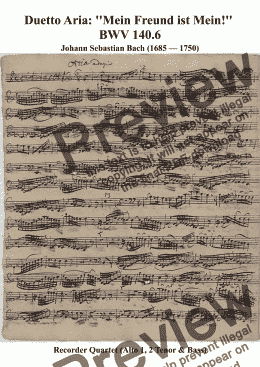Ready to print
You have already purchased this music, but not yet printed it.
This page is just a preview and does not allow printing. To print your purchase, go to the My purchases page in your account and click the relevant print icon.
Mein Freund ist Mein! BWV 140.6 for Recorder Quartet (AATB)

Already purchased!
You have already purchased this score. To download and print the PDF file of this score, click the 'Print' button above the score. The purchases page in your account also shows your items available to print.
This score is free!
Buy this score and parts
Mein Freund ist Mein! BWV 140.6 for Recorder Quartet (AATB)
$8.00
Preview individual parts:
Instant download
You are purchasing high quality sheet music PDF files suitable for printing or viewing on digital devices.A transcription of J.S. Bach's Duet from Cantata Number BWW 140.6 transribed for Recorder Quartet consisting of two Alto's, Tenor & Bass Recorder.
The sixth movement, "Mein Freund ist mein!" (My Friend is mine!), is another duet for soprano and bass with obbligato oboe. This duet, like the third movement, is a love duet between the soprano Soul and the bass Jesus.Gardiner notes that Bach uses the means of "contemporary operatic love-duets in his use of chains of suspensions and parallel thirds and sixths". Dürr describes it as giving "expression to the joy of the united pair", showing a "relaxed mood" in "artistic intensity".
Wachet auf, ruft uns die Stimme ('Awake, calls the voice to us'),[1] BWV 140, also known as Sleepers Wake, is a church cantata by Johann Sebastian Bach, regarded as one of his most mature and popular sacred cantatas. He composed the chorale cantata in Leipzig for the 27th Sunday after Trinity and first performed it on 25 November 1731.
Bach composed this cantata to complete his second annual cycle of chorale cantatas, begun in 1724. The cantata is based on the hymn in three stanzas "Wachet auf, ruft uns die Stimme" (1599) by Philipp Nicolai, which covers the prescribed reading for the Sunday, the parable of the Ten Virgins. The text and tune of the three stanzas of the hymn appears unchanged in three of seven movements (1, 4 and 7). An unknown author supplied additional poetry for the inner movements as sequences of recitative and duet, based on the love poetry of the Song of Songs. Bach structured the cantata in seven movements, setting the first stanza as a chorale fantasia, the second stanza in the central movement in the style of a chorale prelude, and the third stanza as a four-part chorale. He set the new texts as dramatic recitatives and love-duets, similar to contemporary opera. Bach scored the work for three vocal soloists (soprano, tenor and bass), a four-part choir and a Baroque instrumental ensemble consisting of a horn (to reinforce the soprano), two oboes, taille, violino piccolo, strings and basso continuo including bassoon.
Bach used the central movement of the cantata as the basis for the first of his Schübler Chorales, BWV 645. Bach scholar Alfred Dürr notes that the cantata is an expression of Christian mysticism in art, while William G. Whittaker calls it "a cantata without weaknesses, without a dull bar, technically, emotionally and spiritually of the highest order, its sheer perfection and its boundless imagination rouse one's wonder time and time again".



